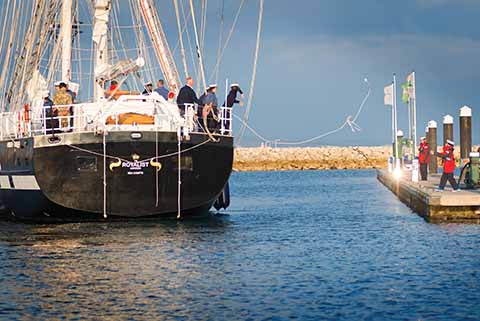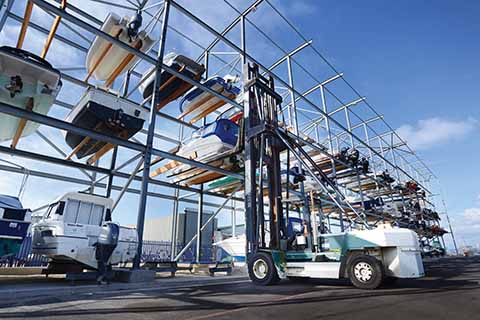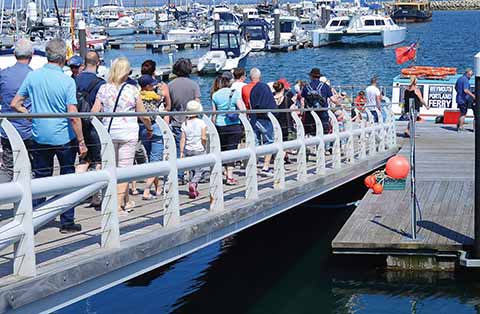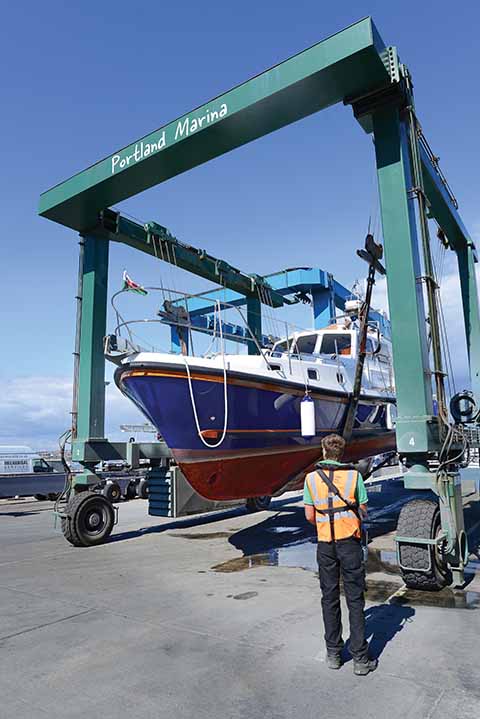A day in the life of a marina
Steve Belasco on what goes on behind the scenes at Portland Marina
Published in April ’19
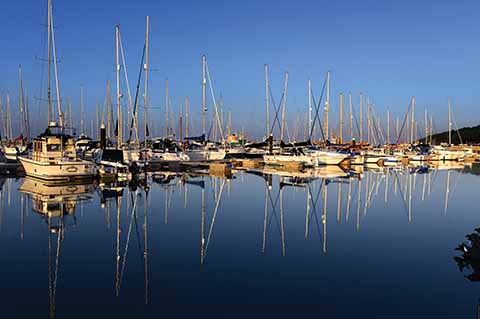
Around eight at night in late spring and the marina is as calm as a mill pond as the last rays of sun illuminate the hulls of the moored boats
The first action this sunny morning is a diesel ‘shout’ from an offshore patrol boat at 8.00;
the boat and crew are waiting at the fuel ‘station’ at Portland Marina. The pontoon can dispense anything from ten litres of petrol to a small RIB nipping out to go fishing, to 10,000 litres of diesel for a state-of-the-art, wave-piercing powerboat departing for Amsterdam.
Four hours earlier, Night Berthing Master David Thomas had briefly stopped on his chilly patrol of the two miles of pontoons to admire a dramatically colourful sky. But, with pretty much nothing between the southern corner of Portland Harbour, where the marina lies, and the eastern Channel horizon, colourful dawns are often taken for granted by staff and boat-owners. They are certainly the norm for David and his colleague, Mike Winter, one of whom will be found on patrol in the wee small hours every night of the year.
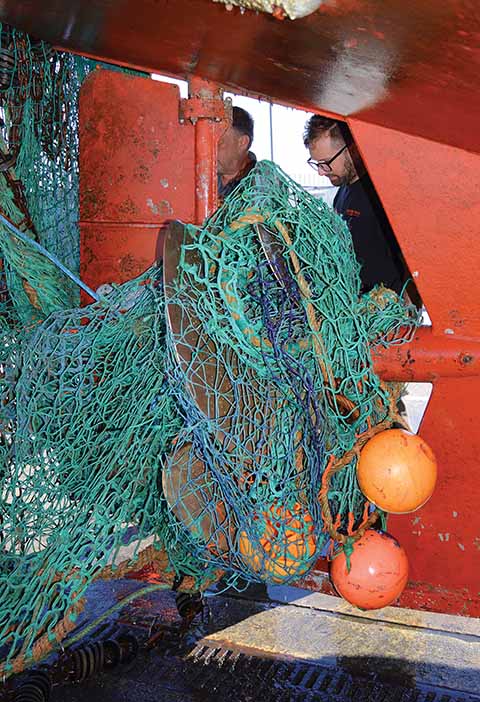
A small trawler, with nets snagged around its prop, is hoisted ashore so the nets and lines can be cut away
David says, ‘As a merchant seaman, I’ve sailed the world’s oceans but I never tire of watching the spectacle of sunrise over our Jurassic Coastline near the end of my watch.’
When the day staff come on duty at 8.00, conditions could be bright and warm with the sun already high in the sky, or cold, wet and windy with no hope of sunshine all day. Whichever, there’s usually a tempting aroma of bacon, eggs and coffee wafting across the decks from the on-site cafe or bistro – likely to lighten even the darkest morn and challenge the strongest resolve.
Portland Marina boasts more than 250 berths on the water, with another 120 in a ‘dry stack’ system where smaller vessels are launched and recovered at the owners’ request. The needs of yachtsmen, fishermen and other mariners are many and have little respect for the time of day or weather and, with a busy boatyard also in operation, a wide variety of skills are employed, from crane drivers to cooks, master mariners to carpenters, plumbers and painters.
The team of Berthing Masters that operate at the marina have new bike racks to install, freshwater standpipes for visiting yachtsmen to be replaced, electricity meters to be read and boats of all shapes and sizes to be moved. That’s on top of the daily fender and line checks, litter-picks, waste and recycling bin changes, toilets, showers, monitoring of the constantly changing visitor status and, of course, security. Boats are not cheap things to acquire and run and owners rightly expect 24-hour protection for their pride and joy.
At marina reception, a group of tired but happy sailors are checking in after a brisk overnight sail from Guernsey. They want hot showers and cooked breakfasts before getting their heads down for a few hours. Later, they will set off for the Solent and their home berth in Cowes.
At mid-morning a call comes in on the VHF radio from the skipper of a small trawler. His propeller has been snagged in his nets and he is being towed in by a fellow fisherman. Can the boat be lifted out at short notice so he can free his rudder and prop and get back to business? The boatyard supervisor checks his schedule and radios them to come directly to the ‘dock’, where the marina’s boat hoist will be waiting. He says, ‘Although we’re busy, in truth we’re unlikely to turn down an urgent request. There’s an unwritten code of mariners offering assistance to each other. You never know when you’ll be the next one caught out and left at the mercy of the elements.’
Further along the main pontoon, a ceremony is under way. A popular couple have died within a short time of each other and their loved ones are heading out to Weymouth Bay to place a Solace Stone onto a reef in memory of them. A close relative says, ‘We’re calling it an “inmerment”. They were very close for more than fifty years and we thought this would be a very fitting farewell to them.’ Friends and family are piped aboard Weymouth charter boat Tango to celebrate the pair’s lives before setting off to place the Solace Stone, containing their ashes, on the purpose-built reef.
There has been a steady flow of vessels calling at the fuel pontoon but just after lunch, heads look up as the stricken trawlerman is brought in by his colleague and made ready to be lifted straight out. The skipper watches anxiously as yard staff manoeuvre his boat into the big, carefully positioned slings that are winched tight before lifting the heavy vessel clear of the water. Although it looks a mess, the situation is deemed not too serious and the relieved fisherman and his friend set to work with very sharp knives to cut the clutter clear. The operation goes smoothly and hardly holds up the day’s schedule.
Next out in the hoists is a handsome motor yacht to have her hull power-washed clean before being slowly wheeled two hundred metres into the yard for regular maintenance work.
In the meantime, Berthing Master Joe has been drilling and bolting bike stands into place at various points. Many owners and workers use bikes as a quick and easy method of travelling back and forth to their boats and there is a perceived need to have locations to store them temporarily on the pontoons.
The full recycling bins have been towed away and replaced, using the marina’s born-again golf buggy, and the boatyard staff have been busy lowering and raising boats from the dry stack with a giant fork-lift truck.
At the marina office, there is a constant stream of customers, phone calls and VHF shouts, with queries ranging from the cost of a year-round berth and booking a rally visit from a Cornish yacht club, to giving an on-site weather report and the time of the next passenger ferry departure to Weymouth. Staff have been assisting visitors from all along the south coast as well as many parts of Europe (some of whose English is better than others!) and providing information to novices rounding Portland Bill for the first time.
As evening approaches, there’s an increase in yachts arriving on the visitor pontoons as vessels end their voyage for the day and make landfall to stay for a night or a week. The cafe has been busy all day and now the on-site bistro is bustling, feeding and victualling hungry sailors and
locals alike.
At 9.00 night man Mike Winter arrives. Like David, he appreciates the aesthetics. ‘I love watching nature at its extremes,’ he says. ‘The peace and quiet of a still night as well as the ferocity of the occasional storm.’
With the evening light providing as handsome a start to his working day as the dawn did for
the end of David’s, Mike sets off on his first ‘pontoon patrol’.
